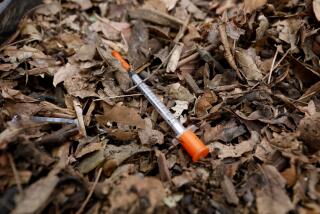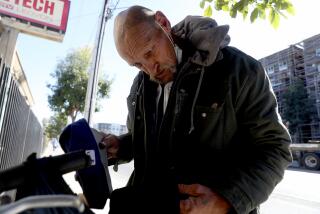Tragedy Spurs Demand for New Drugs, Products : AIDS Creates Niches for Medical Firms
- Share via
Despite its tragic nature, the AIDS epidemic is creating new opportunities for a handful of Orange County companies.
From drug makers to manufacturers of hypodermic needles, local firms are helping their bottom lines by offering alternative medical care, drug therapies and even marketing new products to protect health care workers from the deadly disease.
While some companies have used fear of acquired immune deficiency syndrome to sell their products, “most of them are doing their damnedest” to meet the needs of those suffering from the disease, said Steven Reid, an analyst with the Los Angeles investment firm of Wedbush, Noble & Cooke Inc.
Moreover, remarked Peter Sidoti, of Drexel Burnham Lambert Inc.: “Even funeral companies make money on other people’s misfortune.”
AIDS, for example, has breathed new life into ICN Pharmaceuticals Inc. and Newport Pharmaceuticals International Inc.--two Orange County drug makers whose proprietary products are being touted as potential AIDS treatments.
Costa Mesa-based ICN has soared in price on the New York Stock Exchange this year, largely because of speculation that its drug Virazole eventually will be approved for use against AIDS.
For the same reason, ICN’s two principal subsidiaries, Viratek Inc. and SPI Pharmaceuticals Inc., also have posted spectacular gains on the stock market. All three companies are involved in the manufacture and marketing of Virazole.
The drug, available in the United States only as a treatment for a sometimes-fatal infant respiratory disease, is sold over the counter in Mexico. AIDS patients smuggling the drug into the United States from Mexico may account for as much as $250,000 a year in revenues, estimated Milan Panic, ICN’s founder and chairman.
ICN hopes to file for federal approval of Virazole as an AIDS treatment by the end of February--provided that results of recently concluded clinical trials support such an application, Panic said.
Another much-ballyhooed AIDS drug, Isoprinosine, is undergoing new clinical trials after being rejected as a treatment for the disease by the Food and Drug Administration last February. Isoprinosine reportedly is smuggled into the United States from Mexico by desperate AIDS patients.
Isoprinosine--manufactured for nearly two decades by Newport Pharmaceuticals, of Newport Beach--is sold in approximately 90 countries but has never been approved for use in the United States.
The drug is used overseas in treating a variety of viral ailments ranging from herpes simplex to the common cold, and, early in its life, was promoted briefly as an aid to memory enhancement. An FDA official recently called it a “drug in search of a disease.”
Despite the problems both Newport and ICN have had with the FDA, the federal agency recently grouped Virazole and Isoprinosine with other potential AIDS drugs that will receive expedited review if FDA approval is sought.
And while the two companies have yet to win federal permission to sell their products as AIDS treatments in the United States, other local firms have entered the domestic market.
One of the most successful has been Caremark Inc., a Newport Beach firm specializing in home-based intravenous therapy.
Because many AIDS patients require little more medical treatment than daily doses of antibiotics, hospitalization often is a waste of money and an emotionally draining experience for the patient.
Caremark claims that infusion therapy at home can shave as much as 60% off the cost of similar treatment in a hospital’s AIDS ward, where charges can easily total $1,000 a day. Targeting insurance companies, employers and AIDS support groups, Caremark pitches home infusion as a low-cost alternative to hospitalization of AIDS patients, said Gail Gallagher, Caremark’s director of marketing.
Since the epidemic began, Caremark has treated more than 700 AIDS victims nationwide. But as the AIDS crisis has grown, so have the referrals from doctors, hospitals and insurance companies.
In November, the company added 110 new AIDS patients to its roster, Gallagher said, or more than four times the 25 patients admitted in November, 1985. During the fiscal year that ends next June, Gallagher estimated, Caremark’s AIDS-related revenues will total about $4 million, an increase of 167% over the $1.5 million recorded last year.
And the increased demand for in-home care of AIDS patients is helping to create new markets for other products.
Santa Ana-based Luther Medical Products Inc., for example, recently developed a new catheter specifically for in-home use with AIDS patients.
The Luther catheter--used for long-term infusion of medication and nutrients--can be inserted by a nurse at home, said Ron Luther, the company’s chairman and president. And because it is made of a soft material, the catheter doesn’t need to be replaced as often.
“The object is to make these last as long as possible because these people are so debilitated that they often don’t have the mechanics for blood clotting and fighting infection,” Luther said. “You don’t want to put any more holes in them than you have to.”
Luther, who already has sold some of the new catheters to Caremark, estimates that his company will sell $50,000 to $100,000 worth of the devices during its current fiscal year, which ends next June.
ICU Medical Inc., of Mission Viejo, has taken a somewhat different approach to catheters and needles.
Its products are designed primarily to protect doctors, nurses and others who care for patients with contagious diseases, including AIDS.
This month, ICU will begin shipments of what it calls the “High Risk” needle, designed to prevent health care workers from sticking themselves after administering injections.
Unlike conventional needles, ICU’s version uses a sliding plastic guard that covers the tip of the needle after an injection. The guard cannot be retracted and the needle is rendered harmless.
Although AIDS researchers say the risk of contracting AIDS from a single needle puncture is minimal, ICU nevertheless uses the disease as a selling point in brochures promoting its “High Risk” needle.
ICU, which also manufactures a catheter lock and feeding tube valve designed to protect health care workers from infected body fluids, expects to record about $700,000 in sales this year, Dr. George Lopez, ICU’s founder and chairman, said. Next year, the privately held company’s sales are expected to balloon to $9 million, he said.
Protecting health care workers also is the aim of Viro Research International Inc., a tiny Laguna Beach company that plans to begin shipments this week of an anti-AIDS soap for use by dentists and doctors.
Dubbed “Klenz-AIDS,” the liquid soap has as its active ingredient the spermicide nonoxynol- 9, which researchers say has killed the AIDS virus in the laboratory. A 17-ounce container of the soap sells for $8.50, said Geraldine Dettman, who founded the company a year ago on about $20,000 in savings.
Dettman, who holds doctorates in molecular biology and biochemistry, said she has no idea yet how much of the product she can sell. However, since introducing samples of Klenz-AIDS at a dental trade show in September, Viro Research has booked about $2,000 worth of orders, she said.
COMPANY CITY PRODUCT Caremark Inc. Newport Beach In-home infusion therapy ICN Pharmaceuticals Inc. Costa Mesa Virazole Viratek Inc. Costa Mesa Virazole SPI Pharmaceuticals Inc. Costa Mesa Virazole ICU Medical Inc. Mission Viejo, Anti-stick needle Luther Medical Products Inc. Santa Ana Specialized catheters Newport Pharmaceuticals Int’l Newport Beach Isoprinosine Viro Research International Laguna Beach “Klenz-AIDS” soap
More to Read
Inside the business of entertainment
The Wide Shot brings you news, analysis and insights on everything from streaming wars to production — and what it all means for the future.
You may occasionally receive promotional content from the Los Angeles Times.









